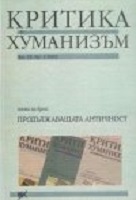Александър Ничев за литературната теория на Аристотел
Alexander Nichev's interpretation on the literary theory of Aristotle
Author(s): Nikolai GochevSubject(s): Cultural history
Published by: Фондация за хуманитарни и социални изследвания - София
Summary/Abstract: The article is divided into three chapters entitled as follows: 1) "The Riddle of the tragic catharsis"; 2) The classicist as a literary theorist; 3) "The Riddle" as a moral allegory and esoteric treatise. The first chapter presents Alexander Nichev's interpretation on the content of the Aristotelian concept of catharsis, as expressed in his most important book - L`Enigme de la Catharsis Tragique dans Aristote, Sofia, 1970. Catharsis seems to be a logical result of the development of the plot of tragedy. In the beginning the audience is moved to feel compassion and to share the emotions, to which the main character is driven. The fear and the compassion felt by the audience are enhanced by the doubts in the divine justice. Why do gods allow the misfortune of an eminent and virtuous (at least at first sight) mythological personage? However, during the development of the plot the spectator sees that the disaster of the main character is a just consequence of his sin towards the gods (megale hamartia). So, the spectator is getting convinced in the justice of the happening and thus he is released of the fear and the compassion he had felt earlier, sharing emotionally the disastrous evolving of the events in the plot. What the spectator feels now towards the tragic character could be named philanthropy. According to Al. Nichev, this replacement of eleos kai phobos with to philanthropon is the essence of the tragic catharsis. In the second chapter, entitled "The classicist as a literary theorist" the author makes an attempt to clarify the conception of Nichev on the interpretation of the ancient literary and philosophical text. Nichev is convinced that the best understanding of the ancient text is the one, proposed by the ancient authors themselves. That's why the literary theorist who deals with ancient texts has to be acquainted primarily with the ancient literary theory, which is to be the chief if not the only instrument for the understanding of the texts. As for
Journal: Критика и хуманизъм
- Issue Year: 2002
- Issue No: 13
- Page Range: 35-50
- Page Count: 16
- Language: Bulgarian
- Content File-PDF

